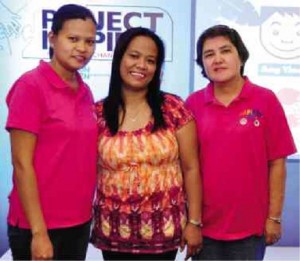Successful women entrepreneurs set ‘records’

MASTERCARD vice president for marketing and client relations Judith Marie Dayrit (left) and MasterCard Apmea group head of communications Georgette Tan
For sari-sari stores, collecting from deadbeat debtors may seem like the ultimate challenge to survival.
One proprietor on a small island in Central Philippines even made headlines for his radical campaign to “motivate” non-paying customers to settle their debts. The store owner launched a shame campaign, posting a list of the most notorious debtors where everyone in the community can see.
But it seems that more than just the inability to collect on debts cause many of these microenterprises to go bust sooner or later.
While sari-sari stores are generally established as a much-needed means to augment the family income, usually whatever the man of the house earns, those who manage them, more often than not stay-at-home moms, do not have the entrepreneurial tools and skills to make the business viable and profitable.
As the non-government organization Hapinoy, which aims to promote micro-enterprises particularly those involving women, found, while sari-sari stores are clearly intended to be money-making ventures, the owners do not or are unable to practice the most basic business rules.
Making lists
Three women Hapinoy beneficiaries say they never realized, for instance, the value of the very simple “paglilista” (record-keeping). Home-based stores often lack records of sales—both cash and credit—and failed to keep track of family members taking part of the day’s earnings or treating the store like the family pantry, taking whatever they wanted when they wanted.
Maribel Tolentino, a Hapinoy beneficiary, says she did not keep any ledgers for her business—no records of debits and credits. “When a typhoon hit our province, we lost everything. We ended up with more debts than collectibles,” she says.

HAPINOY’S managing director Erika Tatad (left), co-founder and president Mark Ruiz and executive director TJ Agulto
Tolentino adds when they managed to raise the capital to reopen their store, “I realized how important it was for us to have records of expenses, income, etc.”
After participating in a workshop conducted by Hapinoy to train women in entrepreneurship and empower them, Tolentino acquired enough self-confidence to even teach her family to respect basic rules of managing a business. “Even my child has learned not to take anything without paying for it,” she says.
Another Hapinoy trainee, Joy Sallan, says, because she learned to keep a record of everything, she saw which direction they were headed. “I can see our profits (so) I started teaching my child about (running the store),” she says.
Marina Reyes says, after the Hapinoy training, she gained enough confidence to demand payment for debts. While there was some resentment at first, her new no-nonsense attitude helped make her customers understand why they had to redeem their IOUs.
Like the other two, she says the need for “paglilista” was the most valuable lesson she learned.
New grant
The significant impact of Hapinoys microentrepreneurship program on the lives of scores of women earned recently its The Hapinoy Sari-sari Store Program (A Community of Nanays, Network of Sari-sari Stores) an additional $25,000 grant from MasterCard to help put up some 500 stores and expand operations in the countries poorest regions particularly Bicol.
Hapinoy first received a MasterCard grant when it won the Grand Prize in Mastercard Worldwide’s Project Inspire: 5 Minutes to Change the World, jointly undertaken with the Singapore Committee of UN (United Nations) Women.
The digital and social media-driven program, which launched recently its 2013 search, encourages young people across the world to empower disadvantaged women and girls in Asia/Pacific, the Middle East or Africa (Apmea).
The project opened in 2011 to mark the 100th anniversary of International Women’s Day and the 25th anniversary of MasterCard in Apmea.
As Grand Prize winner in Project Inspire, Hapinoy received a $25,000 Women’s Empowerment Grant to implement its initiatives.
Georgette Tan, Mastercard Apmea group head of communication, says Project Inspire was based on the belief that “when you empower a woman, you empower her family…”
Tan says, “Women start a business to make sure there is food on the table and to educate the children.”
Mark Ruiz, who founded Hapinoy with Sen. Paolo Benigno “Bam” Aquino, said the project “tapped the potential of the humblest/smallest entrepreneur” and was “able to showcase the best in Filipino women.”
Hapinoy executive director TJ Agulto says the training focused on specific behaviors to help the women microentrepreneurs succeed, like record-keeping and how to increase daily sales. He says “credits were reduced because women had better records. Even pilferage decreased and husband and children learned to respect the women entrepreneurs.”
Eventually, Agulto says they would want the “graduates” of Hapinoy to train, inspire and serve as role models of other women.

